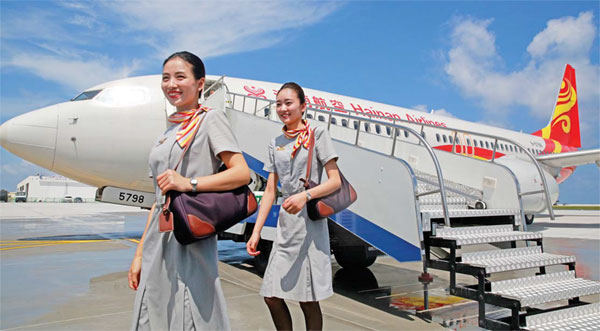Islands welcome first civil flights
Updated: 2016-07-15 08:05
By Zhang Yunbi(China Daily Europe)
|
|||||||||
New runways cut travel time for 1,000-plus km trip to southernmost China from 30 to 2 hours
Two civil airliners touched down for the first time on runways on Meiji Reef and Zhubi Reef in the South China Sea on July 13, showing the feasibility of the two new Nansha Islands as flight destinations in China's southernmost territories.
The Nansha Islands now have three airports accessible to commercial airliners - in January, an airliner landed at Yongshu Reef - opening the possibility of travelers covering the 1,000-plus kilometers to the islands in two hours.
|
Flight attendants of Hainan Airlines arrive at Zhubi Reef in the South China Sea on July 13. The airplane was one of two that landed for the first time on runways on Meiji Reef and Zhubi Reef. Feng Yongbin / China Daily |
Up to now, visitors' only option was to travel by ship for more than 30 hours from Hainan Island to Zhubi, a scenic reef in the southern part of the South China Sea, and then another nine hours heading southeast to Meiji Reef.
On the morning of July 13, China Southern Airlines and Hainan Airlines jets took off from Meilan International Airport in Haikou on their respective two-hour test flights to Meiji and Zhubi.
In Zhubi, airport personnel gathered to greet the crew on board and burst into applause.
Hainan Airlines pilot Hu Xianzhong says: "Zhubi is one of the southernmost reefs of the country, and it is a heartfelt honor to conduct the test flight and land at this airport as a pilot and as a Chinese citizen."
Both planes returned to Haikou in the afternoon. It remains unclear whether the flights to two reefs will become regular routes.
Prior to the civil flights, civil aviation authorities conducted flights to the two airports on July 12 to verify the airports' ability to ensure the safety of civil airliners.
Observers say that as the South China Sea is one of the busiest airspaces for international flights, the new airports could prove useful for emergency landings and eventual maritime search and rescue missions.
Wu Shicun, president of the National Institute for South China Sea Studies, says new civilian facilities on the islands show China's "great sense of duty and increasing ability to serve international public interest".
In addition to the airports, China has built lighthouses, hospitals and scientific research centers on the islands that serve the world, Wu says.
The Ministry of Transport confirmed on July 10 that China has completed the construction of four lighthouses on reefs in the Nansha Islands and is currently building a fifth one to aid navigation in the area.
Xinhua contributed to this story.
zhangyunbi@chinadaily.com.cn
Arguments by Manila, Washington are flawed
Why the Philippines' unilateral initiation of the arbitration case violates international law
Pacta sunt servanda (Latin for "agreements must be kept") is a basic principle of international law. China and the Philippines previously reached agreement in bilateral documents on resolving disputes in the South China Sea through bilateral negotiation. Unilaterally initiating the arbitration case and ignoring the previous agreement violated international law.
The unilateral initiation of the arbitration case is a violation of the United Nations Convention on the Law of the Sea and an abuse of arbitral procedures provided for by the UNCLOS. Given the fact that China and the Philippines made a clear choice on the means and procedures for settling their disputes, third-party settlement procedures provided for in the UNCLOS do not apply.
Why the US concept of "freedom of navigation and overflight" is wrong
There has never been any incident affecting freedom of navigation or overflight in the South China Sea, through which 16,000 vessels pass each year.
However, by playing up the issue, the United States is pursuing a hidden agenda.
By alleging that its massive military presence in the South China Sea is essential for freedom of navigation and overflight, the US is attempting to take all the credit on the international stage for ensuring something that is not actually threatened.
The US is portraying China's growing military strength as a major threat to freedom of navigation and overflight in the South China Sea and ratcheting up the bogus "China threat".
The US is creating an excuse to meddle in the South China Sea and bolster US global strategy and maritime hegemony. Politically, the US wants to create and hype up tension in the South China Sea. Militarily, it seeks legal ground for close-in reconnaissance activities.

The US Navy, the strongest in the world, will go wherever it wishes. There are hostile forces in the United States, and they worked together with the Philippines to make the arbitration case. The US is not part of the UNCLOS, but China has been a part of it. The Philippines' leadership made a mistake and misjudgment.
Zheng Yongnian, director of the East Asian Institute at National University of Singapore

Although the Philippines has not asked the tribunal to determine the sovereignty of the maritime territories involved, essentially the question before the tribunal concerns territorial sovereignty, and the tribunal is not entitled to decide such questions. China, in its declaration on becoming a party to the UNCLOS, excluded third-party compulsory arbitration with regard to those issues which the tribunal is being asked to rule on by the Philippines.
Abdul Gadire Koroma, former judge at the International Court of Justice

The case essentially concerns territorial sovereignty and maritime delimitation. However, the Philippines skillfully packaged it as a case concerning maritime entitlement to evade the legal bar on determining sovereignty and delimitation. Furthermore, maritime entitlement is inseparable from territorial sovereignty. Very surprisingly, the tribunal has established its jurisdiction over the case, which, to me, is not based on real law, but on other considerations.
Keyuan Zou, Harris Professor of International Law at the University of Central Lancashire

You cannot have arbitration if one side says it does not participate, because arbitration is between two parties who want to participate. This is particularly ridiculous when it comes to the United States, because it does not adhere to a large number of international treaties. It is ridiculous that the United States comes to the South China Sea, about 8,000 km from the US shore, for political motives. It's deliberately trying to create problems.
John Ross, a columnist in Britain and former deputy mayor of London

Questions of territorial sovereignty are governed by general international law, not by the law of the sea convention, from which the tribunal derives its jurisdiction. There is no enforcement mechanism for awards rendered by tribunals established under the law of the sea convention. Enforcement will depend on the parties to the dispute. China has made it clear it will not accept any award rendered.
Stefan Talmon, a professor of international law at the University of Bonn
(China Daily European Weekly 07/15/2016 page8)
Today's Top News
Live: Truck attack kills over 80 in Nice
Chinese FM extends condolences to attack victims
Li slams attack in France, expresses condolence
May stuns political world by appointing Boris Johnson
Li calls Sino-Mongolia ties 'best ever'
Russian, Chinese officials discuss space cooperation
25 killed, 50 injured as trains collide in Italy
EU called on to fulfill WTO promises
Hot Topics
Lunar probe , China growth forecasts, Emission rules get tougher, China seen through 'colored lens', International board,
Editor's Picks

|

|

|

|

|

|








